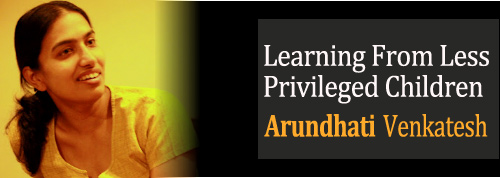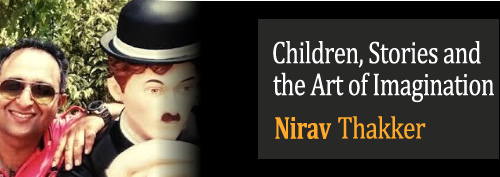Learning From Less Privileged Children
I had no training in special education when I started volunteering at an integrated school. I had no clue how I was going to handle a class in which there would be some kids who could not see, some who could not hear, some with mental health issues, most with all these faculties functioning normally. It was the children themselves who taught me.
When I asked a boy a question, another kid answered on his behalf. Let the boy speak, I said. “Avanige maathu baralla”, I was told. I realized the beauty of Indian languages – ‘words don’t come to him’ is how we say it. Not ‘he is dumb’ or even ‘he cannot hear’. It is not his fault at all – it is the words that don’t come to him. The other children pitched in and used sign language – they had learnt it to be able to communicate with him. I began writing every word I uttered on the blackboard so he did not get left out or feel bored. The boy had been branded ‘dull’ by the class teacher, but there was a gleam in his eyes now. He would raise his hand and write his answers on the blackboard.
Another girl who was born without sight was an outstanding student. She had exceptional memory and focus – nothing distracted her. What I found inspiring was how she was brimming with enthusiasm.
When a little girl kept walking in and interrupting the class, they told me she was ‘loosu’. Not a politically correct way of referring to her condition, I found it unusual. Equally unusual was the love with which they cared for that child.
I had to take my four-year old with me on his days off from school. I was hesitant – how would it affect him? How would they feel seeing this boy who had so much they did not? I need not have worried; they had no such feelings, all they felt was affection. My son learnt a lot about life. When I asked him how he felt knowing that some people could not see or hear, he said he felt ‘happy’. Then, he explained that he was grateful because he had eyes and ears that worked.
We adults are always drawing lines, and trying to define everything we encounter. These lines and definitions arrived at on the basis of our limited knowledge and parameters give us comfort and security. Children, on the other hand, don’t look for lines and definitions. They tend to accept things as they are. Take a child to the zoo for the first time and you will see the reaction of someone who has never seen all these strange creatures before – slithering snakes, multi-colored parakeets, humongous hippos. The child is interested, but takes everything at face value – that all these creatures have an equal right to live is not questioned.
It is as we grow older that we get these perceptions of what is “normal” or acceptable, and what is not. We try to slot people into categories – Visually Impaired. Hearing Impaired. Differently-abled. Mentally challenged. Autistic. Dyslexic. Spastic. Homosexual. Bisexual. Transsexual. Even in the so-called normal category, some are less acceptable than others – Dark-skinned. Poor. Shy. Fat.
Here were these kids who lived away from family (or had none), wore hand-me-downs, and owned only the most basic stationery. When a donor distributed packets of snacks, they always wanted to share it with me. When four of my son’s friends come over to our home, all hell breaks loose. Yet, these twenty kids were able to peacefully coexist and resolve issues independently, with all their worldly belongings in a single room.
We plodded through phonetics. We would reward ourselves with word games and stories. Story-time was fun for everyone, and challenging for me – I had to really act like a monkey so the boy who couldn’t hear would follow. Then, one day, B, a boy who had been termed a “slow learner” read a sentence all by himself. It was the biggest achievement, and the look on his face the biggest reward. There was no stopping him as he turned one page after the other. From then on, the boy who had always tried to hide hoping he would not be noticed began volunteering to participate.
The school year was over, and the class broke up for the summer holidays. Many of the kids went home (it is a residential school), some stayed back. B was one of those who went home. He never came back. When school resumed in June, I missed B terribly. The kids sensed it. ‘B is not gone’, they said. ‘This is B’, they pointed to a new boy. Did they believe it, I wondered. They insisted it was old B in a new form. When I asked what his name was, they laughed and said it was B. I realized I had underestimated them. They had grown up with B; I had only spent a few hours a week for a year. But they coped… much better than me.
Arundhati Venkatesh is an engineer by degree, a mother, an observer of life and people, a feminist, a minimalist and a compulsive maker of lists! An IT professional in her previous life, Arundhati now works for an NGO that empowers the differently-abled. Arundhati reviews children’s books at saffrontree.org. You can also find her at www.womensweb.in – an online magazine for the thinking woman. She records her adventures with her son at http://arundhativ.blogspot.com.

